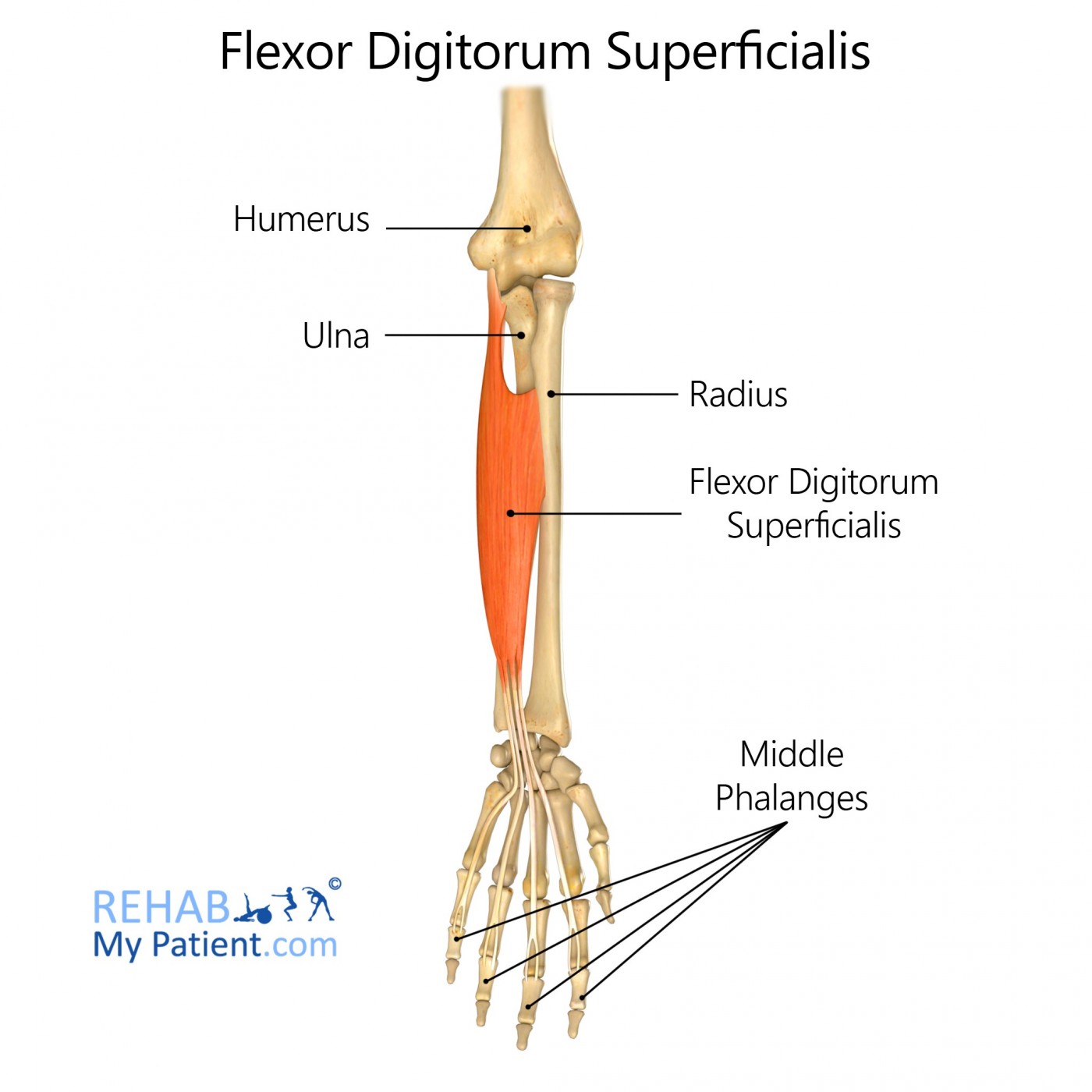Flexor Digitorum Superficialis
Posted on 23rd Jul 2020 / Published in: Hand/Fingers/Thumb , Wrist

General information
Flexor digitorum superficialis is a flexor muscle located in the anterior compartment of the forearm.
Literal meaning
Superficial muscle that flexes (bends) the fingers.
Interesting information
Flexor digitorum superficialis is considered by some to be the deepest muscle in the superficial layer of the anterior compartment of the forearm. Others claim that it is more appropriately classified as a discrete intermediate layer in the compartment.
It is not uncommon for people to be missing a flexor digitorum superficialis attachment in their little finger. This anatomical variation in the muscle insertion can complicate diagnoses of injury to the smallest digit.
The function of flexor digitorum superficialis can be observed by flexing a single digit against moderate resistance. The other digits should remain in the extended position.
Since flexor digitorum superficialis is essential to the grasping function of the hand, injury can be quite disabling. Overuse injuries of the muscle are common in weightlifters. Flexor digitorum superficialis weakness will detract not only from the force of the grip but also the ability for wrist flexion. Any activities requiring a degree of wrist flexion, such as typing on a computer, will be made difficult.
Origin
The medial epicondyle of the humerus in addition to sections of the ulna and radius.
Insertion
The bases of the four fingers (middle phalanges).
Function
Flexes the wrist and digits, except for the farthest digital joint.
Nerve supply
Median nerve (C8, T1)
Blood supply
Ulnar artery

Relevant research
Current methods of clinical examination of flexor digitorum superficialis (FDS) are inadequate in addressing the many anatomical variations in the muscle. Following a suspected tendon injury, expanded examination techniques must be employed.
Jane S. Tan, Laura Oh, Dean S. Louis (2009). “Variations of the Flexor Digitorum Superficialis As Determined by an Expanded Clinical Examination”. Journal of Hand Surgery, Vol 34, Issue 5 , 900-906.
By expanding on the findings of the previous study, researchers were able to develop a novel method for examining the FDS. The new technique does not involve the excessive applied force required by conventional methods.
Tan J, Kim CH, Lee HJ, Chen J, Chen QZ, Jeon IH (2013). “A new examination method for anatomical variations of the flexor digitorum superficialis in the little finger”. Clin Orthop Surg. 2013 Jun; 5(2):138-44
Flexor digitorum superficialis exercises
Wrist flexion exercises are ideal for strengthening flexor digitorum superficialis. To perform wrist flexion with a dumbbell, you should sit in a comfortable chair with your knees and legs slightly apart. Rest your forearm on a table with your palm facing up. Place the dumbbell in your hand and flex your wrist which will bring the dumbbell towards your body. Perform three sets of ten then switch arms.

The dumbbell can be substituted with a resistance band.

To give your flexor digitorum superficialis a good stretch, stand an arm’s length from a wall. Place your flattened hand on the wall with your fingers pointing downwards. Gently lean into your palm to feel a stretch. Hold for 15-30 seconds then switch arms.

Sign UP
Sign up for your free trial now!
Get started with Rehab My Patient today and revolutionize your exercise prescription process for effective rehabilitation.
Start Your 14-Day Free Trial